Set in contemporary Iran, A Separation is a compelling drama about the dissolution of a marriage. Simin wants to leave Iran with her husband Nader and daughter Termeh. Simin sues for divorce when Nader refuses to leave behind his Alzheimer-suffering father. Her request having failed, Simin returns to her parents’ home, but Termeh decides to stay with Nader.
When Nader hires a young woman to assist with his father in his wife’s absence, he hopes that his life will return to a normal state. However, when he discovers that the new maid has been lying to him, he realizes that there is more on the line than just his marriage.
Asghar Farhadi, director of A separation, was born in 1972 in Isfahan, Iran. Whilst at school he became interested in writing, drama and the cinema, took courses at the Iranian Young Cinema Society and started his career as a filmmaker by making super 8mm and 16mm films. 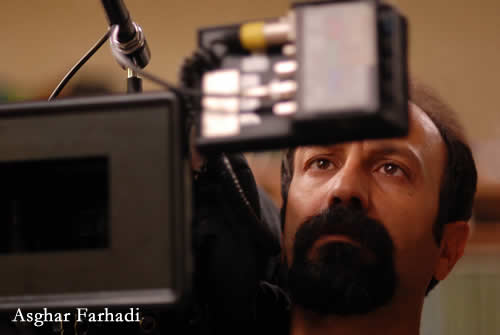
He graduated with a Master’s Degree in Film Direction from Tehran University in 1998. During his studies, he wrote and directed several student plays, wrote for the national radio and directed a number of TV series, including episodes of Tale of a City. In 2001, Farhadi wrote the screenplay for Ebrahim Hatamikia’s box-office and critical success Low Heights.
His directorial debut was in 2003 with Dancing in the Dust. After Beautiful City, in 2004, and Fireworks Wednesday in 2006, Farhadi directed About Elly, winning the Silver Bear for Best Director at the 2009 Berlin International Film Festival and Best Narrative Feature at the 2009 Tribeca Film Festival.
A Separation is his fifth feature and is nominated for the Best Foreign Language Film Award at Golden Globe Awards and is Iran’s Entry for 2012 Oscars.
Bijan Tehrani: Where did the idea of “A Separation” originate and how did it develop into a screenplay?
Asghar Farhadi: I don’t remember when the idea first occurred to me. Stories usually form without one being aware of them; they form in one’s mind so gradually that it’s hard to tell when they actually take shape. There was a time when a set of scattered, unconnected images in my mind became linked, as in a puzzle. The connecting tissue became the story—for instance, the image of the man bathing his father who’s suffering from Alzheimer’s. I’ve lived with this image for some time; it is part personal memory part imagination. After thinking about it for a long time I started writing the story a year and a half later and finished the first draft in four months.
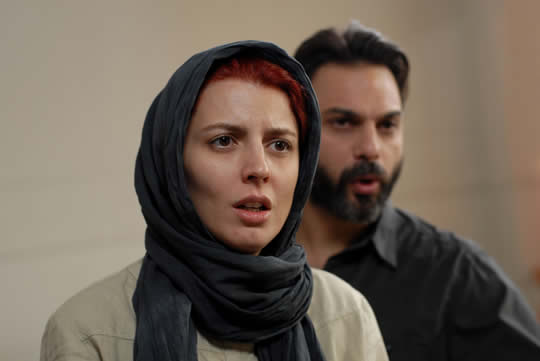 BT: Your films are very realistic—especially this one; it’s like watching real events unfold. This is characteristic of movies that are based on personal experience. How close is this story to your personal experiences or else your observations?
BT: Your films are very realistic—especially this one; it’s like watching real events unfold. This is characteristic of movies that are based on personal experience. How close is this story to your personal experiences or else your observations?
AF: The movie is not directly related to my personal experience. Well, except the old man who suffers from Alzheimer’s; we had a relative with a similar condition in fact. But the family life portrayed in the film is unconnected to my personal life. Fortunately, I’ve never experienced divorce, except indirectly. Divorce is widespread, commonplace and noticeable in our society; yet one has to avoid letting things feel common and ordinary. It’s good to wake up every day and see things as if for the first time; so as to remember them. Based on that, I can say that most of this story derives from observation, not from personal experience.
BT: Another very interesting aspect of your films, especially this film, is that everything is unpredictable, like life itself. The main protagonist turns out to someone other than the person one had expected, and the stars switch position as the movie unfolds; this makes it very difficult to predict what may happen next. Is this predetermined and intentional?
AF: This pattern has to do with how drama functions. Drama is a story where one is always guessing the next moment, and where the outcome may turn out to be different than expected. Analysis and mystery are at the heart of drama. I don’t like boring movies, no matter how important their message may be. The audience should enjoy the show rather than have to check the clock all the time to see when it will be over.
Holding the audience’s attention is a matter of the structure and plot. Typically, crises follow very important actions and decisions by the lead characters—the lead character 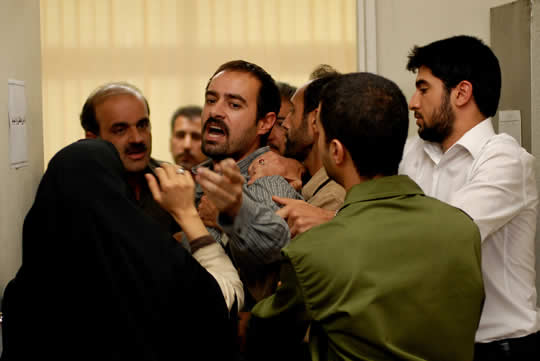 makes a decision at a critical moment that then grows into a crisis. I’ve tried to avoid that routine. The fact is that a lot of insignificant and apparently unimportant, everyday things can also add up to create crises. In such cases, one can’t guess the coming crisis because the action that is leading up to it seems so unimportant that it escapes attention. Like life itself. In life, too, there are a lot of small and insignificant things that don’t catch our attention and for which we feel no responsibility; yet they can lead to crises.
makes a decision at a critical moment that then grows into a crisis. I’ve tried to avoid that routine. The fact is that a lot of insignificant and apparently unimportant, everyday things can also add up to create crises. In such cases, one can’t guess the coming crisis because the action that is leading up to it seems so unimportant that it escapes attention. Like life itself. In life, too, there are a lot of small and insignificant things that don’t catch our attention and for which we feel no responsibility; yet they can lead to crises.
Another point is that dramatic stories are often unrealistic, both in style and in their plot; this is true even in Hitchcock; his work is one step removed from reality, but it is all about suspense and analysis. I’ve tried to use a style that is at once documentary and dramatic; it’s an attempt to create drama with a realistic approach. It was an interesting experiment.
BT: Life is full of events that cannot be fully explained. In movies, however, the general rule is to spell out everything to the audience. That’s not the case in your work. Some examples are the money that goes missing in the house, and the ending.
AF: The general rule comes from distrusting the audience’s intelligence and trying to provide too much information. It’s like airports that display such an excess of signs—as if travelers were a bunch of dummies—to actually make travelers get lost. Offering too much information and too many explanations and clarifications doesn’t give the audience the opportunity to make a guess, which stunts the imagination and the sense of discovery.
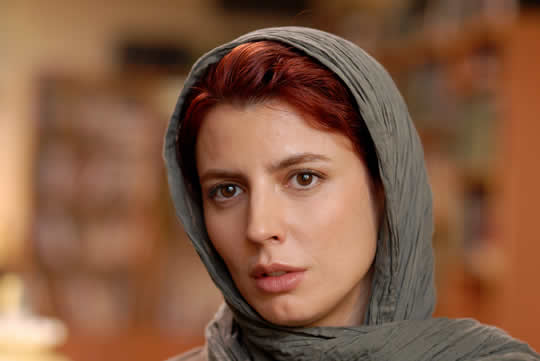 I’ve always tried to respect the audience by providing just enough baseline information; the audience enjoys guessing and unraveling the story by themselves rather than having everything spelled out for them. Like life itself. We don’t understand all the events that we come across fully or from every angle. Our understanding may grow over time and with new evidence, but we don’t grasp everything in its totality at the moment we’re experiencing it. As in life, so in movies—i.e., the need for realism and for openness.
I’ve always tried to respect the audience by providing just enough baseline information; the audience enjoys guessing and unraveling the story by themselves rather than having everything spelled out for them. Like life itself. We don’t understand all the events that we come across fully or from every angle. Our understanding may grow over time and with new evidence, but we don’t grasp everything in its totality at the moment we’re experiencing it. As in life, so in movies—i.e., the need for realism and for openness.
Of course I’m also careful not to make everything so enigmatic that the audience grows confused and detached. But consider the example of the missing money; the audience thinks about what happened to the money? Why wasn’t that clarified? Who stole the money? In fact, the explanation may be embedded in the movie but when the audience was watching the scene, the moment didn’t seem important and so they don’t remember. In the opening scene we see Simin give the money to the movers who are hauling the piano, but the action doesn’t seem noteworthy enough for us to remember. It is in fact such unremarkable details that add up to crises later, just like in real life where we take the events that eventually develop into crises as insignificant at the time they occur.
But back to your question, I personally enjoy getting a little involved when I watch a movie, and discovering some things by myself instead of having it all spelled out for me.
BT: Another feature of your work is the acting, which in fact is invisible; the actors themselves are in fact the characters. How did you select the actors and how do you 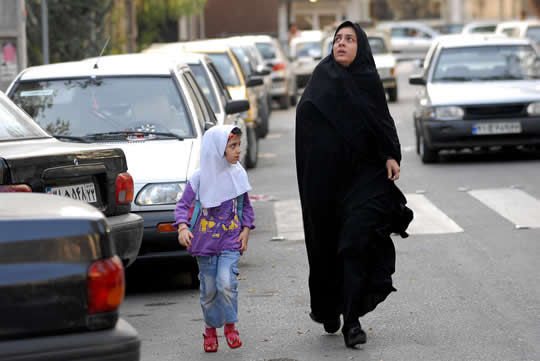 normally work with the cast?
normally work with the cast?
AF: There was a time when it didn’t make much difference to me whether the actors were professionals or amateurs; I picked them depending on how well they matched the role. Gradually, however, I was drawn to professional actors and as the plots grew more complex I realized that while amateur actors are original and fresh, they can’t perform complex and multi-layered roles because they don’t share a common language with the director and can’t understand what he wants. Professional actors can, on the other hand, and those are my choice in my recent movies. Still, I look for professionals who act like amateurs, meaning actors who appear like amateurs on camera. It makes me happy when many who live outside Iran ask me if the actors [in A Separation] were amateurs. That means they’ve acted as if they were real. I was lucky to have found skilled actors.
We experiment for a long time ahead of filming—not the traditional method of sitting around a table and reading the script. We undertake exercises, both in the studio and across the city, not all of which are related to the movie or the story that we’re working on; but they help the actors play their part well.
This long process helps the actors gradually develop their character, just as it helps me gradually discover the characters and come to know their shape and color and be able to describe them in writing. I don’t hand a fully formed character to the actor and I don’t tell them what to do; I want them to get to create the character by taking the same steps as myself, meaning that I want them to experience the process of creativity.
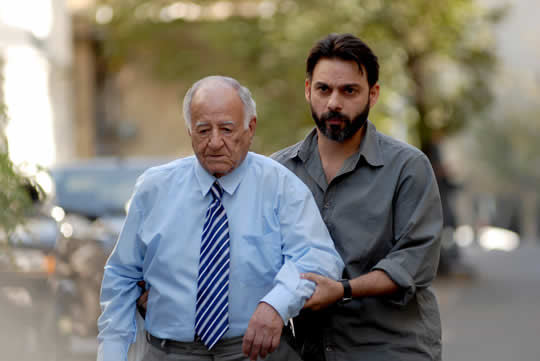 BT: One of the questions that people who have seen the movie ask me frequently is whether the old man who plays the father is an Alzheimer patient himself? The role is rather simple but his acting is really superb.
BT: One of the questions that people who have seen the movie ask me frequently is whether the old man who plays the father is an Alzheimer patient himself? The role is rather simple but his acting is really superb.
AF: No . . . Fortunately, Mr. Shahbazi is a very spirited and sportive man; he walks and exercises more than all of us every day and is perfectly healthy and energetic and good humored and cheerful; he’s the epitome of all the positive things in the world; he’s a really remarkable man that’s full of energy.
BT: He played his role–which seemed simple–extremely well.
AF: True. And it was quite a challenge; he’s a cheerful and youthful man, which contrasts with the part he had to play. He is a really skillful actor.
BT: When the film opens, Simin appears to be the leading actor but that role is gradually taken over by Nader and Simin ends up playing a smaller part in the movie.
AF: It’s the plot that determines the presence of each actor in the movie, not the writer, really. As the story develops, even the writer becomes its follower, meaning that it’s the story that tells him where to go and where not to. Simin may have less screen time but she’s the prime mover of much that develops in the story. She lights the first spark and by leaving the house, forces Nader to hire a caregiver. She then disappears for a while before returning later; one feels her absence and one feels that it is due to her absence that the events are unfolding.
It’s standard practice to have one or two lead parts in a movie, with the rest in supporting roles, so called, as if they don’t count as individuals and their sole function is to support and complement the lead. I’ve avoided this pattern in my recent films; I’m thinking each character should be considered a lead, even if they’re on the screen only briefly. I tried it first in “About Ellie,” and in “A Separation” I came fairly close to what I hoped to achieve. In future films I’ll try to stand by one character and have her/him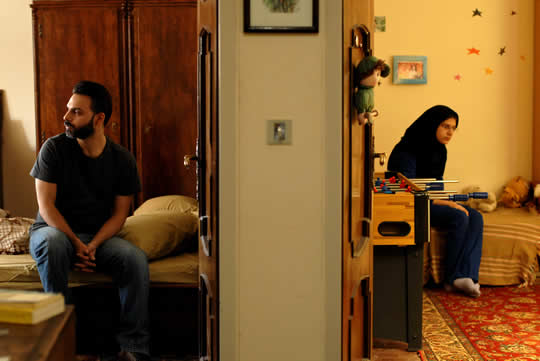 drive the plot, and then move on to another character and then another and keep changing positions among the personalities in the story.
drive the plot, and then move on to another character and then another and keep changing positions among the personalities in the story.
BT: This is the first Iranian movie nominated for a Golden Globe Award and selected for the Best Foreign Language Film Oscar. What do you think about that and what do you think about your chances?
AF: To tell you the truth, I’m not very familiar with the process at the Golden Globe and Oscars. But two factors count in a competition besides the quality of the film, one is the other contenders—and evidently many good foreign films from different countries have been selected this year. Secondly, publicity, which is very critical in the Oscars because the Academy numbers nearly 6000 members, meaning that a film has to be publicized so widely and so well that these six thousand people get to see it so they can vote. I don’t know what will happen and how much money will be spent on publicity. Anyway, I hope that it will be on the right track because if something good happens, it will make everyone in Iran very happy. But I try not to think about this because I can’t predict the outcome.
BT: Are you currently working on a new film?
AF: I’ve started a screenplay that I think will take a year to write. I’ll spend next year working on it.
BT: Thank you very much and good luck!
Translation of interview from Farsi to English by Mahasti Afshar, a Cinema Without Borders film critic.
